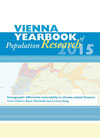-
Overcoming the Barriers Between Demography and Climate Science
October 28, 2016 By Sreya Panuganti
The 2015 edition of the annual Vienna Yearbook of Population Research is a special issue on differential demographic vulnerability to climate-related disasters. Many of the 16 articles are worth reading, but here are 2 of particular interest.
Adrian C. Hayes, a sociologist and demographer at Australian National University, addresses why so few demographers are working on climate change. In, “Population Dynamics and Climate Change: A Challenging Frontier for the Intrepid Demographer,” he outlines three major challenges. First, given the complexity of climate science, climate science can represent a “steep learning curve for a demographer.” Next, there is not necessarily a conceptual framework that embraces not only the physical science of climate change but the social and environmental elements of demography. Finally, in framing climate change as a social problem, demographers are faced with an ethical challenge to delineate “which and whose social values need to be taken into account and protected.” Demographers must address moral questions of whose interests are being safeguarded – the current or future generations’ – and how biodiversity and the health of ecosystems fit into the equation. It is for these reasons Hayes suggests the number of demographers working in climate change are so few. If they can be overcome, however, he concludes there is a major window of opportunity for population scientists to make significant contributions to climate change research.
Indeed in “Will Climate Change Shift Demography’s ‘Normal Science’?” Lori M. Hunter and Jane Menken make an argument for why population scientists should shift their focus from their “normal science” to consider environmental issues more regularly and give examples of fruitful collaboration. The authors write that now is the time for population scientists to contribute to the growing body of climate change research. Migration scholars have already had success contributing to the understanding of how environmental pressures interact with political, economic, and social forces. Population scientists are also helping to analyze demographic scenarios under various climate projections, and there are a number of prominent studies bringing urbanization and aging into climate science. Hunter and Menken write that there are more opportunities for demographers to collaborate with climate scientists as both fields seek to understand the social, economic, and political dimensions of climate change.
Sources: The Vienna Yearbook of Population Research.
 A Publication of the Stimson Center.
A Publication of the Stimson Center.




